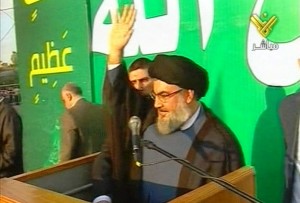 Beirut, Lebanon -Hezbollah leader Sayyed Hassan Nasrallah, in a rare appearance before tens of thousands of faithful, said on Monday the United States would face grave repercussions across the Muslim world unless it suppressed a film that demeans the Prophet Mohammad.
Beirut, Lebanon -Hezbollah leader Sayyed Hassan Nasrallah, in a rare appearance before tens of thousands of faithful, said on Monday the United States would face grave repercussions across the Muslim world unless it suppressed a film that demeans the Prophet Mohammad.
Arguing that the world had not yet grasped the depth of hurt felt by Muslims, Nasrallah called on governments to block access to websites showing the film, which was made in California and depicts Mohammad as a womanizer, homosexual and child abuser.
“They slandered the purity of his birth, slandered his faith and his morals, slandered his Quran,” Nasrallah told tens of thousands of cheering supporters, who had marched through southern Beirut’s Shi’ite suburbs to protest against the film.
“The distribution of this entire film must be banned by the Americans,” he said, to roars of applause.
The influential leader, surrounded by armed bodyguards, spoke to tens of thousands of Lebanese protesters waving Lebanese flags and yellow Hezbollah banners. “America, hear us – don’t insult our prophet!” they shouted. “Enough humiliation!”
Nasrallah’s emergence from hiding lent more drama to his warnings. Fearing assassination, the Hezbollah leader has seldom appeared in public since 2006, when the powerful Shi’ite group’s militant wing fought a month-long war with Israel.
“The world should know our anger would not be a passing outburst but it would be the start of a serious movement that would continue on the level of the Muslim nation to defend the Prophet of God,” Nasrallah said.
He called for websites to stop publishing clips said to be a trailer for the amateurishly made movie called “Innocence of Muslims,” although no full length film has materialized.
The greater goal, Nasrallah said, would be for the world to agree to criminalize insults to any religion and its prophets.
Nasrallah warned of the danger of unleashing further rage if the full-length film emerged.
“America, which uses the pretext of freedom of expression…, needs to understand that putting out the whole film will have very grave consequences around the world.”
The Hezbollah-led protests came after a week of violent demonstrations across Arab capitals, in which several U.S. embassies were attacked, but they stayed well away from the U.S. mission in Beirut and the entire procession finished peacefully.
Some demonstrators said the U.S. refusal to censor the Internet clips was provocative for Muslims, who feel they are often subject to prejudices and aggression by U.S. forces.
“Is it really possible that America can fight wars all over the country and it can’t remove one film? America wants to sew strife for sure,” said Ahmed Afif, 30, as his small son sitting on his shoulders waved a Hezbollah flag.
U.S. President Barack Obama’s administration has condemned the film as “reprehensible” but said it cannot restrict the constitutional right to free speech in America.
MORE PROTESTS CALLED
The clips circulating on the Internet from “Innocence of Muslims”, shows the Prophet in a sexual act with a woman. Many Muslims consider any depiction of the Prophet offensive.
The U.S. ambassador to Libya, Christopher Stevens, and three other Americans were killed in Benghazi, Libya, last Tuesday in an attack on the U.S. consulate that coincided with an upsurge of anger about the film.
After Stevens’ death, Hezbollah sent out a statement condemning the film as immoral, but it also denounced the violent attack in Benghazi.
On Friday, one person was killed when protests spread to Lebanon’s northern city of Tripoli, where thousands of hardline Sunni Muslim protesters torched a fast food restaurant.
The violence erupted on the same day Pope Benedict began his three-day visit to Beirut. The trip was supported by Nasrallah. During his trip, the pope urged Arab leaders to serve justice and peace.
Some Christians on Monday also joined the rally, where protesters chanted “Death to America, Death to Israel”.
“We came here to share with our Muslim brothers in a protest against this insult to the prophet,” said Antoine Dau, 60. “This is an assault on Muslim and Christian co-existence.”
Nasrallah, a powerful figure whose group enjoys the backing of Shi’ite Iran and embattled Syrian President Bashar al-Assad, has also called for protests in the southern coastal town of Tire on Wednesday and the northern town of Hermel on Sunday.
He said the protests against the film were a chance for Muslims to unite – an apparent reference to divisions emerging between Sunni and Shi’ite sects. The move could also serve to evade criticism his group has faced for sticking by Assad, whose crackdown on an 18-month-old uprising has killed thousands.
“They must cooperate and unite to serve their shared goals, even if there some are some differences between them. What has happened stresses … that we must direct anger toward the real enemy and not be dragged into discord.”
Syria’s mostly Sunni-led uprising has proved particularly divisive in Lebanon and led to sporadic clashes in the northern city of Tripoli between Sunnis who support the Syrian rebels and Shi’ites who back Assad.
Reuters

Leave a Reply
You must be logged in to post a comment.